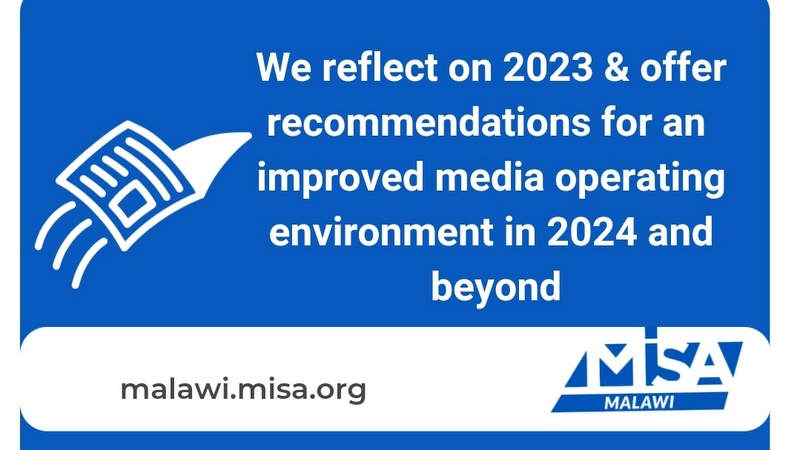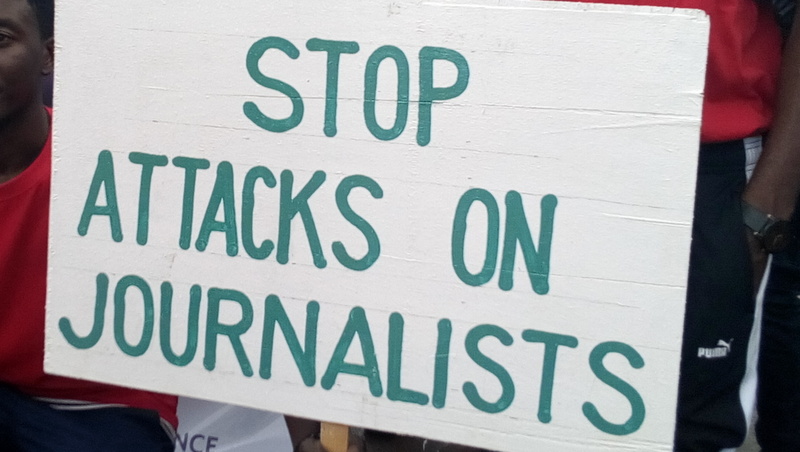As 2023 comes to an end, we would like to sincerely thank the membership, partners, the government of Malawi and all stakeholders for supporting our advocacy on Freedom of Expression, Media Freedom and Access to Information.
Our work was a success because of your technical and financial support, and broader enabling policy and legal environment.
It is important to note, however, that 2023 was another year of persistent and unwarranted hostility towards journalists. This statement reflects on the year and offers recommendations to improve the media operating environment in 2024 and beyond.
1. Summary of Positive Developments
2023 was to a large extent positive in building a relationship of trust between the media and government. President Dr. Lazarus Chakwera once again invited the media to a breakfast engagement as part of the celebrations to mark the 2023 World Press Freedom Day (WPFD). The engagement provided a rare opportunity to discuss broader issues affecting the media and what needs to be done to improve the media operating environment.
As a follow up to the breakfast engagement, State House Communications Team also met MISA Malawi leadership to discuss issues of mutual concern and explore workable ideas to improve the relationship between government and the media. Among others, the meeting looked at how to improve access to the Presidency through the media and also how to ensure a professional and informed media sector to facilitate national development.
Another key positive development for 2023 was the round table discussions with the Malawi Communications Regulatory Authority (MACRA) which included a call for review of broadcasting license fees to be in Malawi Kwacha and not the United States Dollar. MACRA promised to revisit the legal framework and ensure a conducive environment for broadcasters, the majority of whom are failing to pay the fees and have accumulated arrears.
Ending the year on a positive note, on December 7, the National Assembly passed the Data Protection Bill, which seeks to provide a regulatory framework for the processing and transfer of personal data. We celebrated the passing of the Bill as it means, among others, protection of information/data for Malawians, including journalists and sources of information, from unwarranted access. Data protection is very important in promoting media freedom and freedom of expression, key rights that MISA promotes.
2. Negative Developments
Despite these positive developments, MISA Malawi still registered a number of retrogressive cases which should be addressed to safeguard our democracy and ensure a free, independent and pluralistic media.
a) Persistent hostility towards journalists
In 2023, MISA Malawi registered cases of arbitrary arrests, harassment and assault of journalists for merely doing their job. We registered 8 cases in which over 10 journalists were attacked. Sadly, no perpetrator was either arrested or prosecuted for such crimes against journalists. The perpetrators of violence against journalists in the year under review were diverse and included police officers, political party supporters, university students, football club officials and supporters and ordinary members of the general public. These attacks, in whatever form, instill fear in journalists and promote self-censorship, which is retrogressive in a democracy.
b) Restricted online expression
Police continued arresting some ordinary Facebook and WhatsApp users for allegedly contravening the Cyber Security and Electronic Transactions Act of 2016. Arrests based on online expressions have a negative impact on freedom of expression as they also instill fear in people and limit free expression, which is also a negative aspect for every vibrant democracy.
c) Lip-service on access to Information
In 2023, access to relevant information and overall implementation of the Access to Information Act remained problematic forcing others to consider government pronouncements on ATI implementation mere ‘lip-service.’ In the year under review, there was no adequate funding for the oversight institution, the Human Rights Commission (HRC), to effectively perform its functions as provided for in the Act. The Ministry of Information and Digitalisation also delayed in publishing names of information officers, doing so on December 20, 2023, first time since the Act was operationalized in September 2020. All these developments are in direct contrast to the frequent government assurances on access to information, transparency and accountability.
Unlike in 2020, 2021 and up to mid-2022, in 2023, the presidential press conferences were stopped, a sharp reversal in the process of making the Presidency accessible and accountable to Malawians.
d) Currency devaluation that hit the media hard and dollar pegged broadcasters’ license fees that still haunt
In the process of recovering from the Covid-19 triggered economic shocks, the media in Malawi is now grappling with currency devaluation challenges. In May 2022, the Reserve Bank of Malawi devalued the Malawi Kwacha by 25%. In November 2023, the currency was devalued again by 44%. Of course there were also other ‘currency alignments’ in between. Doing business in such an environment has not been easy for the media. It meant the need for salary increments for the workers and more expensive newsprint and broadcasting equipment.
Making matters worse, the dollar pegged Malawi Communications Regulatory Authority (MACRA) license fees meant the devaluation burden rests on broadcasters. This means more broadcasters accumulating license fee arrears. In 2023, the country lost one broadcaster in Maziko Radio Station as MACRA revoked its license due to delayed settlement of the license fees.
3. Our recommendations for 2024 and beyond
1. Police officers, political party leaders and supporters, sports fans and officials and members of the general public must stop attacking journalists. Journalism is not a crime. Attacks on journalists are attacks on media freedom, right to information and freedom of expression. Journalists are not enemies of the nation. Journalists merely work to access information for a well-informed society. If anyone believes a journalist has done his/her job in an unprofessional manner, the solution is not to attack or assault the journalist. There are bodies such as the Media Council of Malawi (MCM) that are responsible for media self-regulation and handle complaints against the media.
2. 2024 is the year of elective conventions for most of the political parties and we expect that many activities in preparation for 2025 Tripartite Elections will be conducted in 2024. We call on political parties to create a conducive environment to ensure easy access to information before, during and after the electoral related activities and support for the media to ensure that Malawians remain informed of such developments and activities.
3. Government should consider going beyond rhetoric on access to information by adequately funding ATI Act implementation activities for the Human Rights Commission.
4. State House must enable access to the Presidency by resuming the Presidential Press Conferences.
5. Government should consider a long-term tax waiver on newsprint and broadcasting equipment to ease the devaluation pressure on the media.
6. MACRA should take advantage of the review of the Communications Act to revise broadcasters’ fees and have them in Malawi Kwacha. MACRA should also have legal mandate to regulate infrastructure sharing costs to protect small broadcasters from unfair business practices.
7. Government should take steps to protect broadcasters as provided for under the African Charter on Broadcasting to ensure survival of independent and pluralistic broadcasting sector.
8. Government should intervene and allow broadcasters settle license fees arrears based on the Dollar-Kwacha rate at the time the arrears were accumulated.
9. The Cyber Security and Electronic Transactions Act needs to be reviewed and responsible institutions should take deliberate steps to raise awareness and ensure that Malawians understand the law.
Happy New Year!
Media contacts
MISA Malawi Chairperson Golden Matonga
Cell: +265 99 616 9705 or email goldenmatonga@gmail.com
MISA Malawi National Director Aubrey Chikungwa
Cell: +265 999 327 311 or email info@misamalawi.org









